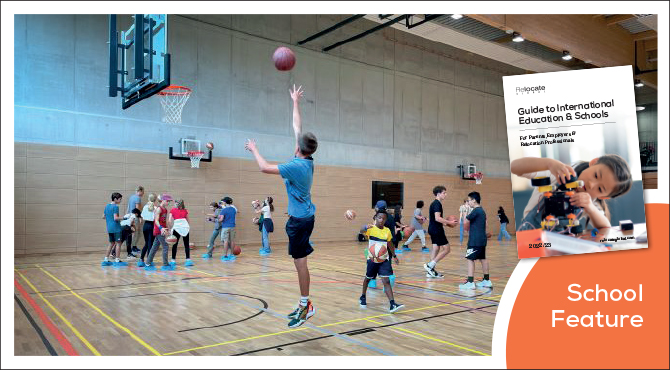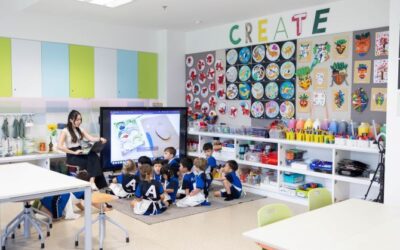Physical Education has changed! Join the movement!

Munich International School’s physical education programme supports pupils and parents alike. The school’s head of physical health education Lieke Burghout explains.
When arriving at Munich International School (MIS) in August 2021, I was given the opportunity to integrate the strategic plan into the curriculum for Physical Education.
PE at MIS is the overall name for Personal, Social and Physical Education in Junior School, and Physical Health Education in Middle and Senior School.
New foundations for excellence in sport and wellbeing for everyone
Having started the new school year in 2022 with the completion of our new 2,080 sqm Fitness and Athletics Building, the curriculum has a plethora of new and exciting possibilities.
The new facility houses four gymnasiums, a fitness and a dance studio and owns spectator seating with the ability to serve as a whole-school assembly hall with space for up to 1,800 students, staff, parents and visitors. Additionally, there are café facilities where large numbers of athletes can now be catered for during games and tournaments.
We now have a progressive learning environment to differentiate and vary the learning opportunities for all our students.
On a mission to challenge and empower
The first step we took as a department was to take a closer look at our departmental mission statement, ensuring it was aligned with the MIS strategic plan and with the philosophy of the IB which states: “The IB develops inquiring, knowledgeable and caring young people who help to create a better and more peaceful world through education that builds intercultural understanding and respect.”
Through research and thoughtful conversations, the MIS PE department has agreed to the following mission statement: “The MIS Physical Education program empowers students to pursue a healthy, active lifestyle through an inclusive curriculum which is challenging, engaging, varied and relevant. We nurture confident and healthy individuals with transferable skills that allow them to adapt to, and positively impact society. We inspire students to grow, take risks, show leadership, and persevere in a safe supportive environment.”
Through our conceptual curriculum, we aspire to develop curious, independent, and physically literate movers and thinkers, who enjoy participating, collaborating, and sharing their knowledge with the wider community.
Whether you are looking for the best boarding schools in India, online schools or researching international and private school fees, make sure to check out our latest Guide to International Education and Schools
What we do at MIS
Through sports and activities our students are taught to incorporate their understanding into a lifelong healthy active lifestyle, and endeavour to impact society in a positive way. The interconnection of health and wellbeing is given personal meaning as our students are challenged and inspired to be adaptive and consistently seek to improve themselves.
Apart from the obvious physical motor-skill development we also focus on social-emotional learning and connect the purpose of the learning experience beyond PHE subject matter.
The mission statement is at the core of all decisions we make in relation to the development of our curriculum. The following are examples of some of the decisions we made in relation to our mission statement.
- Teaching teams in grade levels means smaller, allowing teachers to design an in-depth and purposeful curriculum
- Junior School students change only their outdoor- to indoor shoes instead of their whole PHE kit. This gives students approximately ten minutes of extra active time per PSPE class.
- Junior School has swimming lessons added to their activity time on top of their PSPE classes.
- Swim classes are added to the schedule for students in grades 3 and 4
- Wearing the MIS PE kit is optional for all students at MIS. Students in MS and Srs will need to dress out for PE. They will get to practice their planning and decision-making skills by learning what is suitable to wear under which circumstances.
- Middle School students are able to use the Fitness Studio with their PHE teacher and have started the school year with the unit, “Sport Values: Respect, Equity, and Inclusion”.
- Middle School students are enjoying inter-murals during lunchtime with their friends with guidance of two MS PHE teachers.
- Senior School students are experiencing the conceptual curriculum. Grade 9 students are introduced to motivational psychology and will receive opportunities to take leadership and to make decisions about their own learning. The book ‘Atomic Habits’ by James Clear, will be the theme of the year. Students in grade 10 will gain a better understanding of how to improve their overall wellbeing through a 30-day challenge. They will focus on the brain-body connection; using the book ‘MOVE!’ by Caroline Williams.
- The IB diploma course, “Sport, Exercise and Health Science”, has been added to the course choices.
How to support your child
Parents and caregivers can also assist us with our aspirational goals to inspire our youngsters to become healthy, happy, and active human beings.Through positive role-modeling they set a great example of how children can own their physical literacy journey and stay physically and mentally well. Some ideas as to how to support your child are:
- Be physically active yourself: the World Health Organisation recommends adults do at least 150-300 minutes of moderate intensity/aerobic activity per week.
- Limit your own time spent being sedentary.
- Undertake active family outings.
- Limit screen time before bedtime and allow for enough hours of sleep. (No screens in the bedroom.)
More information about the brain-body connection and leading a healthy lifestyle can be found on our social media channels including the community Facebook group, Twitter and Instagram account using #WeAreMIS and #HealthyHappyWildcats.As you might have noticed, Physical Education has changed a lot over the past decades. A couple of months ago I was asked by the Head of School, Timothy Thomas, to join a conversation about this topic. Find out more and listen to this podcast.Maybe you can even listen to it while going for a walk!PE has changed! Join the movement.
Assignees and families are not alone
Mindfulness also focuses on self-compassion and self-kindness. In the international environment it is easy for employees and family members to feel that they are in this alone and only they are experiencing difficulty in adjusting to the new environment. This is very unlikely. It is typical for all assignees and family members to experience adjustment difficulties, particularly on a first assignment.
Understanding that you are not the only one in this situation and that others also may be suffering problems adjusting can be helpful to improving one’s own sense of wellbeing. It is important therefore to recognise one’s own stress, as well as that of other assignees and their families. A mindful approach helps to build this attitudinal foundation.
Thus, in order to practice self-compassion, it is important to recognise our own stress, understand ourselves, and be aware that we are not alone.
Organisational support
Wellbeing has become a focus of organisational policy recently, particularly following the pandemic. Organisations may provide wellbeing support to international assignees and their families, for example, via employee assistance programmes.
Wellbeing is also supported through safety and security procedures and medical care. While these are all valuable initiatives, organisations cannot “totally deliver wellbeing” to their assignee populations – individuals need to take action themselves in order to benefit from a sense of wellbeing and happiness.
It is not always easy for individuals to do this though and so organisations may wish to consider supporting individuals and family members to undertake mindfulness training – either via courses or by using online materials.
A mindful approach focusing on the present rather than worrying about the past and the future can bring out many benefits in an international assignment, supporting growth and development as well as positivity towards a new cultural environment.



